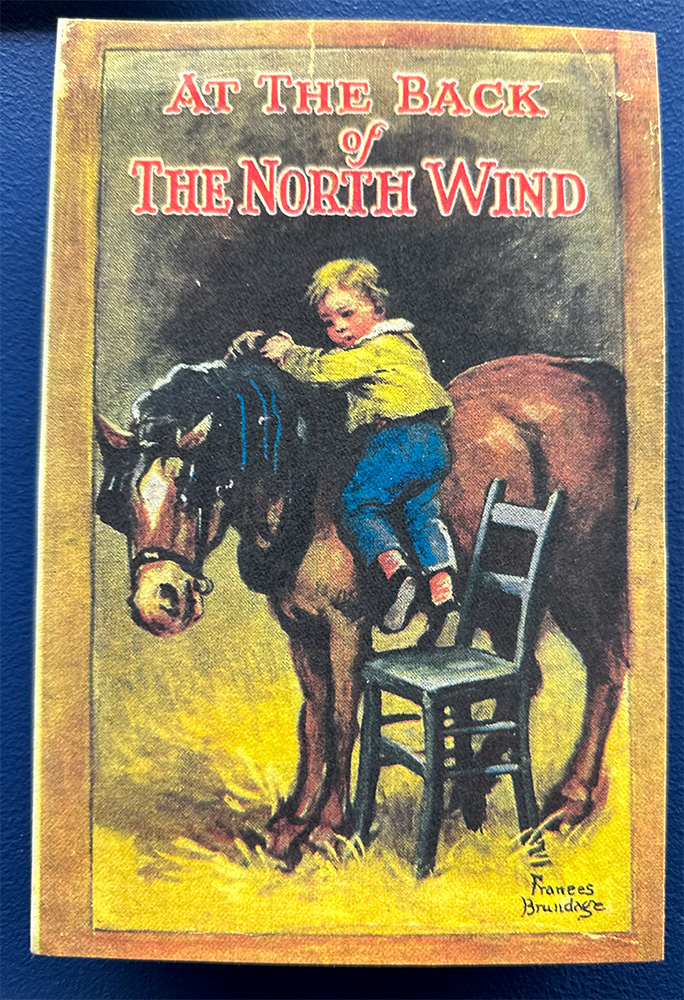“Happy is the man that findeth wisdom, and the man that getteth understanding.” Proverbs 3:13 (KJV)
![]()
One of my kindred spirits is George MacDonald, a Christian teacher. When his words flow into my ears and heart, I visualize the colorful photo on the cover of At The Back of The North Wind and smile. Growing up, MacDonald’s father forbade him from touching a saddle until he rode bareback. His father’s wise methodology reminds me of a horse clinic I experienced five miles from my ranch.
In 1999, my husband and I moved from Alaska to “Big Sky Country” Montana. It was my dream to buy my first horse there and learn to ride before my 43rd birthday, six weeks away. My horse’s name was Desdemona (Dez), after my favorite Shakespearean tragedy, Othello.
Ten years old, my been-there-done-that mare became my babysitter. If I galloped too fast in an arena and came out of the saddle, she stopped, looked down, and waited for me to climb back up. Local cowboys told me my mare was a “push-button” horse. Watching her, they decided she’d been roped off, trail ridden, reined, barrel raced: you name it! Two months after getting Dez, with a few trail rides and horsemanship lessons in our repertoire, we traveled to a clinic where a teacher explained the Seven Games of Parelli Natural Horsemanship, founded by Pat Parelli. The first game—the Friendly Game, designed to touch a horse with your heart and feel relaxed—didn’t work too well with my mare. She wanted to run or chase after cows or walk up a mountain. It was almost like she was rolling her eyes at the sight of me lifting my 4-foot“ Carrot Stick” and stroking every equine body part from head to tail. Every touch cued her into a side pass or backup maneuver. Still, my beautiful Dez tolerated me touching her belly with the stick, even if it tickled.
Next, the clinic instructor passed me a Parelli Bareback Pad with a thin leather handle. I thought, This will be fun! I had no experience with bare back riding, so it was something new to learn. Without much to hang onto—not even stirrups to hoist me up into the saddle—I felt jealous for not having a father like MacDonald’s who instructed him to ride bareback at an early age.
having a father like MacDonald’s who instructed him to ride bareback at an early age.
I coaxed Dez to the fence, climbed two rungs, and lifted myself (more like dropped) onto the padded bareback seat. What fun! My legs squeezed my mare’s belly too tight, and I nearly lost my balance because Dez gaited into a trot. My buttocks shifted left to right, and I almost fell off to one side—but I stayed in the saddle. My riding may not have looked graceful like the other equestrians nor presented my mare at her best, but as we galloped around the pen, I held the flowing mane of my gorgeous mare.
Looking back at that exciting adventure with my first horse, I no longer feel jealous of not having a father like George MacDonald’s. Most days, I feel content and thankful to have God as my father, providing and protecting me. It’s a contentment centered on the determination to make the most of what God has given me, like my beautiful mare ,instead of focusing on what He hasn’t.
Today, as I sit near the fireplace in my living room and look through the window, I remember the high-pitched nickers of Dez and reach fo r MacDonald’s words:
“Let me, if I may, be ever welcomed to my room in winter by a glowing hearth, in summer by a vase of flowers; if I may not, let me then think how nice they would be, and bury myself in my work. I do not think that the road to contentment lies in despising what we have not got. Let us acknowledge all good, all delight that the world holds, and be content without it.”


